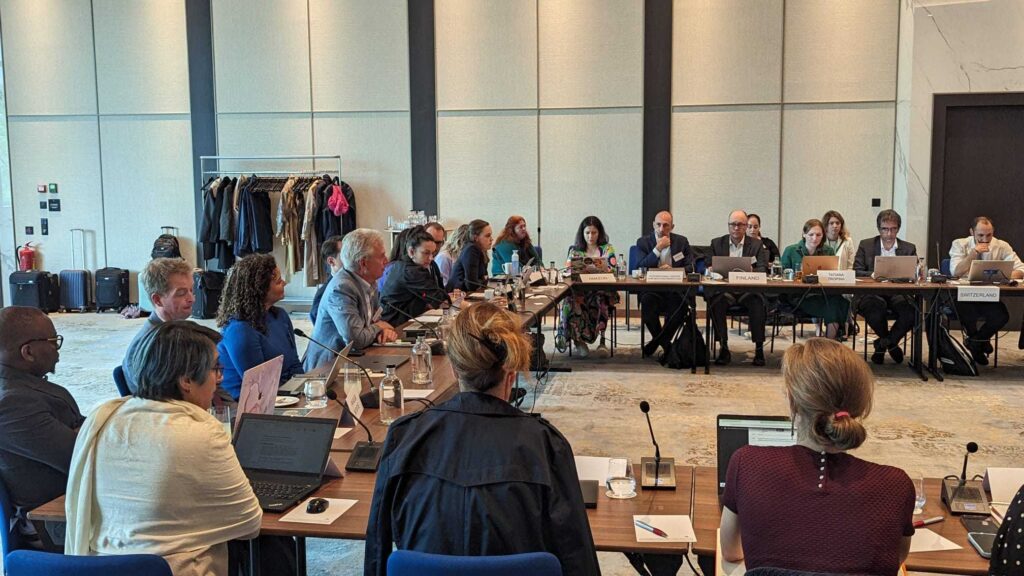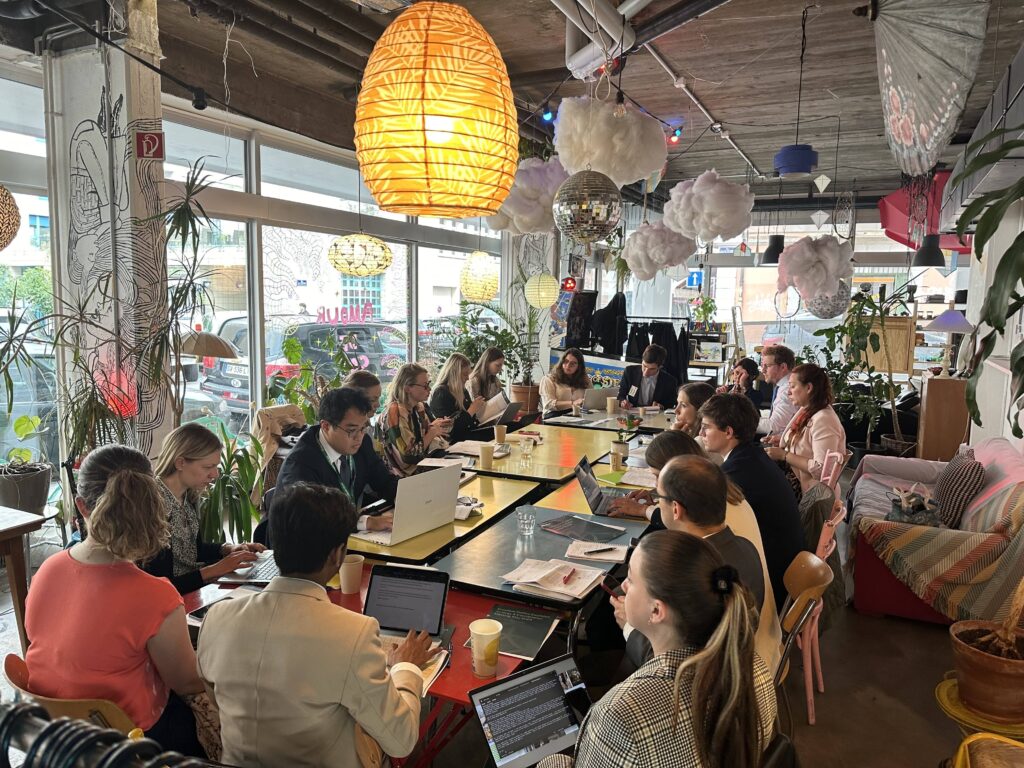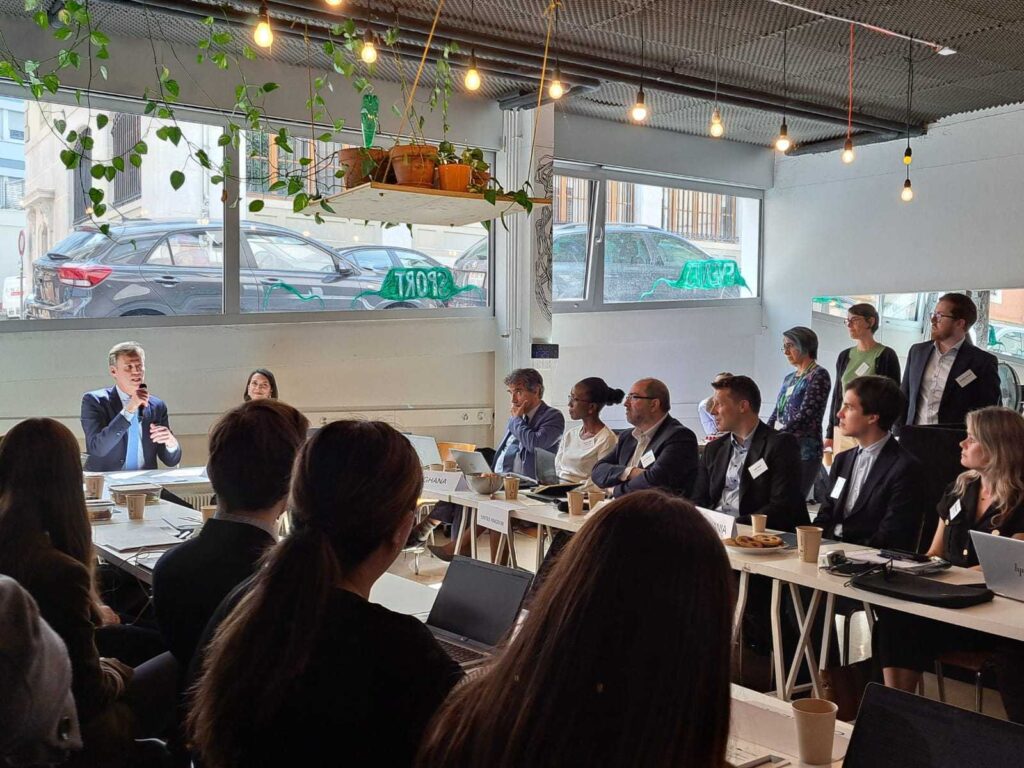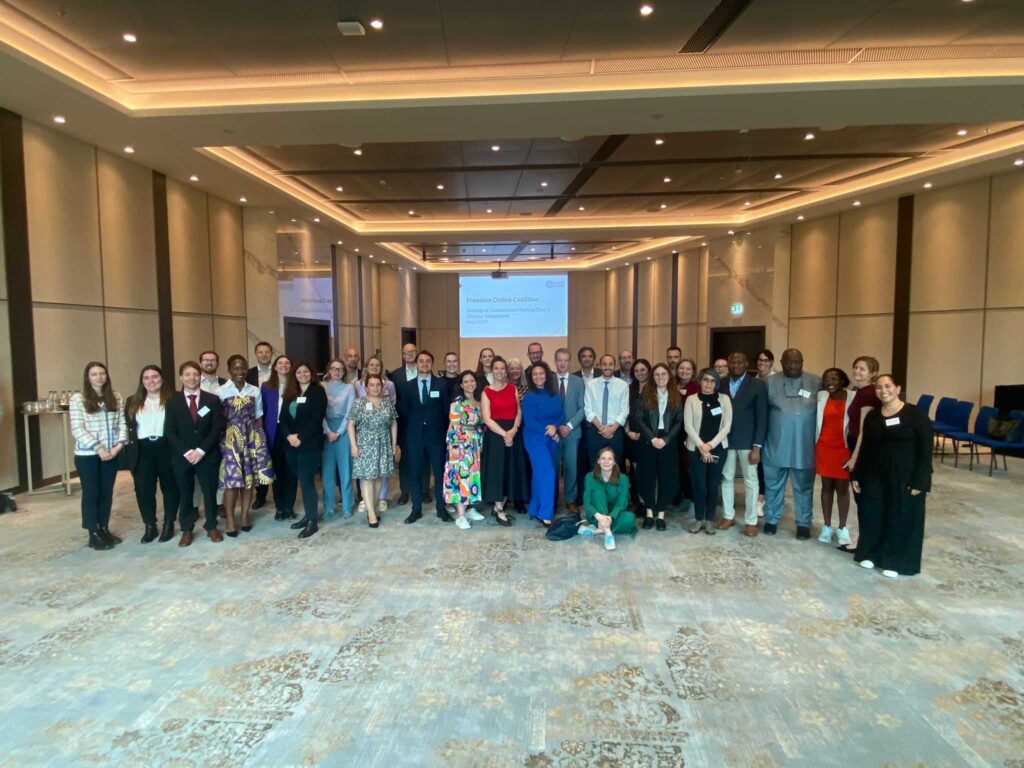The first Freedom Online Coalition (FOC) Strategy & Coordination Meeting (SCM) held under the Dutch Chairship in 2024 took place in Geneva, Switzerland on the 30 – 31 May. The SCM followed a week of multistakeholder convenings including the WSIS+20 Forum High-Level Event and AI for Good Global Summit, and provided an opportunity for FOC Member States, Observers, and the Advisory Network to share information and coordinate engagement in key Internet and digital technology governance processes.
Day 1 of the SCM convened the FOC Steering Committee, Coalition Members, the Advisory Network, and the Geneva Diplomatic Network in separate meetings to reflect on recent activities and progress towards implementing the 2024 Program of Action. Following updates on activities in the first two quarters of 2024, Day 2 of the SCM facilitated a deep-dive into the Global Digital Compact text, with input from both governments and the multistakeholder community. In addition, participants engaged in a learning session on the WSIS+20 review process, and discussed upcoming events and outputs for the remainder of the year.




To read the SCM summary report, visit the following link. Key highlights from the activities that have taken place so far in 2024, and insight into the SCM discussions can be found below:
Engaging in Key Internet and Digital Tech Governance Processes
To strengthen effective and inclusive coordination between governments, civil society, the private sector, academia and the technical community at such a critical time for Internet and digital technology governance, the FOC has been taking concerted steps to ensure that outcomes of key governance processes, namely the Global Digital Compact and the Pact for the Future, advance a human rights-based and multistakeholder approach to the governance of digital technologies, including the Internet and artificial intelligence (Goal 1, Program of Action).
To this end, the Coalition has hosted a number of convenings during the Netherlands’ Chairship, both at the multistakeholder and multilateral level, ranging from capacity-building and panel sessions on advancing human rights in the digital ecosystem, to workshops, consultations and strategic discussions on shaping the Internet and digital technology governance landscape in 2024/2025, zeroing in on the FOC’s position in the Global Digital Compact process.
The strategic discussions culminated at the SCM, which allowed taking stock of the work that has been done through the Coalition, and an opportunity to assess how Member States can continue upholding the FOC’s shared commitment to a human-centric and human rights-based, inclusive digital future that leaves no one behind. FOC Members and FOC Advisory Network members focused on FOC engagement in the Global Digital Compact and Pact for the Future by considering concrete language proposals around priority issues related to the FOC’s mandate, and building on existing resources for negotiations. As part of the SCM, the FOC also hosted an interactive learning session on the World Summit of the Information Society (WSIS) and engagement in the WSIS+20 Review.
As the respective processes for the GDC and Pact progress over the coming weeks, the FOC will continue to serve as a platform for strategic coordination, and look ahead to plan engagement in the Summit of the Future in September, and the WSIS+20 Review in 2025.
Regional Outreach
As Chair of the Freedom Online Coalition (FOC) in 2024, the Kingdom of the Netherlands is co-hosting a series of multistakeholder regional dialogues, convening government officials from the region, members of the FOC Advisory Network, and other regional stakeholders, to foster a discussion on digital issues and human rights, including the governance of the Internet and artificial intelligence technologies.
The first dialogue took place during the Digital Rights and Inclusion Forum in Accra, with the Cyber Security Authority of Ghana as co-host together with the Netherlands. This was followed by a dialogue on the margins of the NETmundial+10 Conference in São Paulo, co-hosted with the government of Chile.
The dialogues invited participants to share insights and perspectives on key topics related to the FOC’s mandate and the Program of Action 2024. In addition, they explored the Coalition’s outreach efforts and ongoing discussions on key processes critical to Internet and digital tech governance such as the GDC.
The SCM provided an opportunity to discuss key insights from the regional dialogues, and further reflect on the Coalition’s outreach efforts to Global South stakeholders, including recently held sessions and workshops during the World Press Freedom Day Conference in Santiago, and the UN Civil Society Conference in Nairobi. Members also heard updates on the next regional dialogue, which will seek to engage stakeholders based in the Asia-Pacific region.
Looking Ahead to the Remainder of 2024
The co-Chairs of the Coalition’s Task Forces on Artificial Intelligence and Human Rights (Germany and the International Center for Not-for-Profit Law), Internet Shutdowns (United Kingdom, Access Now, Global Network Initiative), and Information Integrity Online (Denmark, the Netherlands, Wikimedia Foundation), provided key updates during the SCM on outputs and activities taking place in the remainder of 2024.
The Task Forces, which provide a multistakeholder platform for focused and issue-based engagement relating to key priority areas for the Coalition, noted efforts to collaborate with the multistakeholder community on various statements and highlighted planned sessions and side-events during upcoming fora including the Summit of the Future.
During the Joint Roundtable session, Coalition Members and the Advisory Network also explored efforts to promote diversity, equity, inclusion, and accessibility (DEIA), with the co-Chairs of the Task Force on Digital Equality (2021-2023) presenting the findings of a report which assessed a broad spectrum of the FOC’s activities, from its internal structures, to its learning landscape, and its policy and advocacy decisions, in relation to advancing DEIA principles. Efforts to implement recommendations from the report will be pursued in the coming months under the Dutch Chairship of the FOC.
Participants also heard from the FOC Chair on upcoming convenings to facilitate information and knowledge sharing, and to build upon coordination efforts for key processes identified above. In addition, the 2025 Chair of the FOC, Estonia, provided remarks and highlighted the forthcoming process to develop next year’s Program of Action.
